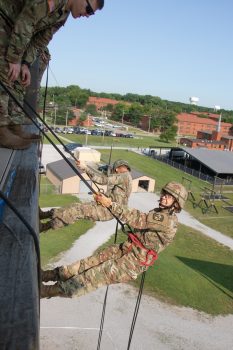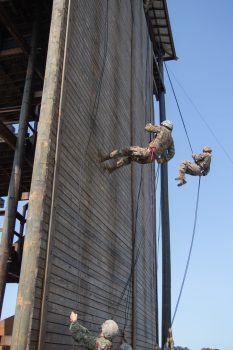
Imagine the tension of hanging in a roller coaster car during that slight pause at the top of the first vertical drop, anticipating the ride down. This is similar to what the Cadets of 6th Regiment, Advanced Camp experienced today on July 3, 2021, except there was no car, and they were hanging by a rope with their legs supporting them against a flat wall before jumping off and rappelling 64-feet down.
The rappel tower is meant to push Cadets to overcome their fears, and to build up trust in their gear and procedures. The stakes felt high, but these Cadets were in safe hands, and they gained strength by pushing forward.
2nd Lt. Jeremy Stass, one of the rappel instructors who stood at the top of the tower, chose to make little bits of small talk with Cadets he got them ready to go over the edge. This was to get their focus off the stomach-churning view behind them, and onto himself and the task at hand. He has done it himself dozens of times, and he could empathize with their anxiety.
“The rappel tower is pretty daunting. It’s more common for people to be fearful of it than not,” said Stass. “Once you’re working through it and going through step by step, you realize that it’s not as big of a challenge as you think it is.”
The training first consists of a lesson on how to tie their own rope harness, followed by a short, slanted wall for practice. After this, the Cadets mounted the long stair case to the top, and went down the vertical wall first, then the open side of the tower, with safety inspections conducted between everything.

It’s dizzying for many Cadets at the top, but Captain Adrian Sanchez of Arizona State University stated: “If you’re un-easy and you’re scared, take a step back, accept it, and operate in that zone and you’ll be alright.”
The strategy of getting into the “zone” seemed to work as Cadets pushed themselves. The real encouragement however, was from each other. Any Cadet who felt fear knew that their comrades were right there with them.
“My platoon is strong. We all support each other,” said Cadet Nicholas Ketner of Bloomsburg University of Pennsylvania. “Even if you’re scared, be mentally tough, overcome it. It’s scary, but if you overcome it you’ll feel a lot stronger in the end.”
The whole training was a success and most Cadets walked away with a smile, and a newfound inner strength.
“Show up with the common fears, but don’t let that become crippling and not let you have a good time,” said 2nd Lt. Stass. “Know that everything that you want to be accomplished, can be accomplished.”




